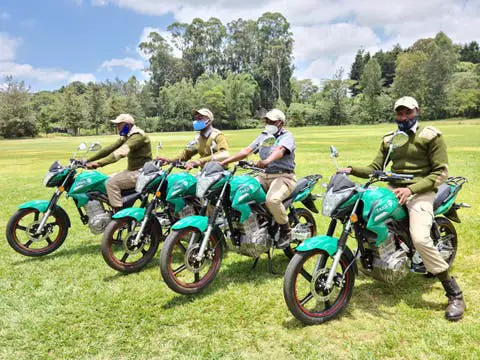Electric Motorbikes hit the Kenyan market.
On 2nd March 2021, The UN Environment Programme (UNEP) launched a pilot electric bikes project in Kenya's capital, Nairobi at Karura forest. This is a move to roll for Africa's shift to electric mobility.


On 2nd March 2021, The UN Environment Programme (UNEP) launched a pilot electric bikes project in Kenya's capital, Nairobi at Karura forest. This is a move to roll for Africa's shift to electric mobility. The pilot project saw 49 motorcycles from China's Tailing Technology Group made little noise but raised much interest in Nairobi's Karura Forest aims to help policymakers assess the barriers in uptake of the much-needed technological shift towards electric bikes, and to demonstrate that the shift is feasible and within reach.
David Rubia, UNEP's Sustainable Mobility Unit Management Officer, said the main objective of this pilot project is to evaluate various aspects of electric motorbike operation. This will help policymakers develop a good policy framework to see a sustainable shift to low low emissions electric mobility in Kenya, starting with two and three-wheelers.
Operating a motorcycle is cheap due to lower operating costs than those with internal combustion engines. The electric bikes do not have a clutch and the rider does not experience abrupt starts. They also have a speed limit of 45km/h.
Joyce Msuya, UNEP deputy executive director said Kenya is importing more motorcycles than cars, doubling its fleet every 7-8 years, noting that the motorcycles are generally inefficient and poorly maintained polluting. Immediately after the launch, Msuya added that Kenya's electricity is very green in 2019 with more than 80 percent was generated by hydro, solar, geothermal, and wind. Shifting to electric bikes in Kenya, Rwanda, Uganda, and elsewhere will reduce costs, air pollution and Greenhouse Gas Emissions, as well as create jobs.
According to UNEP, a global leapfrog to electric vehicles, already underway in countries like Norway and China, is essential to curb carbon dioxide emissions. This pilot project has rolled out in four locations in Kenya and is expected to expand in an effort to reduce air pollution, improve national energy security and create green jobs.
The 2018 number of Boda-boda taxis registered was at 1.5 million and will likely grow over five million by 2030, according to the UNEP. In developing countries, the rate of electric motorbikes is growing faster, but lack vehicle emissions standards or programs and incentives to promote zero-emission vehicles.
Kisumu county is among the place that the pilot project will be tried on. Governor Peter Anyang' Nyong'o said that electric motorcycles not only mitigate against this health hazard but also help reduce noise pollution that the rampant increase of petroleum-powered motorbikes currently causes in our cities.




